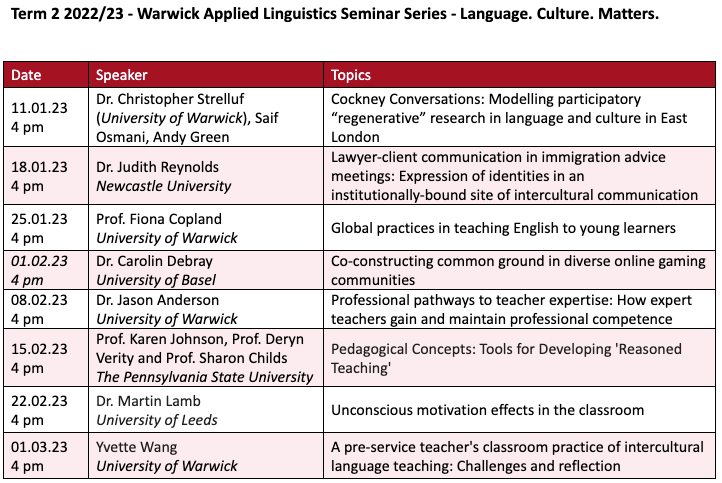Composite calendar
Wednesday, January 25, 2023
-Export as iCalendar |
Study CafeOnline |
-Export as iCalendar |
URSS Application SupportOnline |
-Export as iCalendar |
GHCC Reading Group: Jonathan E. Robbins, Oil Palm: A Global History (University of North Carolina Press: 2021)FAB5.01 |
-Export as iCalendar |
GHCC Reading Group: Jonathan E. Robbins, Oil Palm: A Global History (University of North Carolina Press: 2021)FAB5.01 |
-Export as iCalendar |
Research Seminar - George Watson (Online) |
-Export as iCalendar |
Introduction to Miro - open to all Arts Faculty staff and studentsFAB2.25Miro is the most popular platform for online creative collaboration, the default tool for many industries in design and creative digital. In this session Rob O'Toole will show how to get started, and share some of the tricks for successful collaborations and projects. Please email robert.o-toole@warwick.ac.uk if you would like to attend. |
-Export as iCalendar |
Hispanic Studies Research Seminar: Liliana SalamancaFAB3.32 |
-Export as iCalendar |
Applied Linguistics Seminar Series - Language. Culture. Matters.Location: A0.23, Social Sciences Building & MS Teams
We warmly invite you to our Applied Linguistics Seminar Series - Language. Culture. Matters. In term 2, we will still organise the seminar series in a hybrid mode. We will have speakers in person and online, but no matter where the speaker gives the talk, all seminar series will be held in a hybrid form. These are great opportunities for all students and academics to keep updated about recent developments in academia, discuss different topics and network with other scholars and students. For all speakers and topics in this new term, please see the outline below.
|
-Export as iCalendar |
French Research Seminar - Lydie Moudileno (USC)OnlineWednesday 25th January: Lydie Moudileno (University of Southern California), 'Finding Dahomey: African Royalty in the Diasporic Imagination' |
-Export as iCalendar |
History Research seminar, One of the most Melancholy of Accidents: Changing Narratives in British Burns Treatment, 1800-2000OC0.04chair: Roberta Bivins speaker: Jonathan Reinarz, Birmingham discussant: Andrew Burchell |
-Export as iCalendar |
Warwick Workshop for Interdisciplinary German Studies: Nick Lawrence (Warwick), '"Everything Changes": Brecht, Benjamin, Adorno'FAB 3.30This paper looks at the question of historical last chances through the prism of a 1944 poem by Bertolt Brecht, “Alles wandelt sich [Everything changes],” refracted through related work by two contemporaries, Walter Benjamin and Theodor Adorno, and projected into an afterlife conditioned by altered senses of crisis and catastrophe. Reviewing the theory of historical contingency and opportunity developed by Benjamin, and the method of lyric reading proposed by Adorno, the paper aims to revise the latter’s understanding of a social poetics in which the poem serves as a ‘sundial telling the time of history.’ Instead, it outlines what might be called lyric theory for a warming world, in which, paraphrasing Andreas Malm, we can never read in the heat of the moment, only in the heat of an ongoing past. |
-Export as iCalendar |
WWIDGS Seminar - Nicholas Lawrence (Warwick)FAB 3.3025 January 2023 Nicholas Lawrence (Warwick): Title tbc. |

